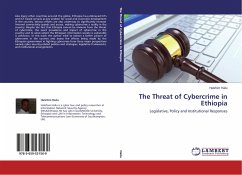Like many other countries around the globe, Ethiopia has embraced ICTs and ICT based services as key enabler for social and economic development in the country. Various efforts are also underway to significantly increase Internet connectivity speeds and access, making cybercrime a reality in the country. Despite the fact that Ethiopia cannot be immune from the threat of cybercrime, the exact prevalence and impact of cybercrime in the country and to what extent the Ethiopian information society is vulnerable is unknown. In this work the author tried to extract a better picture of cybercrime in the country and assess the efforts being made by the Ethiopian government in fighting cybercrime from three major perspectives namely cyber security-related policies and strategies, legislative frameworks, and institutional arrangements.
Bitte wählen Sie Ihr Anliegen aus.
Rechnungen
Retourenschein anfordern
Bestellstatus
Storno








